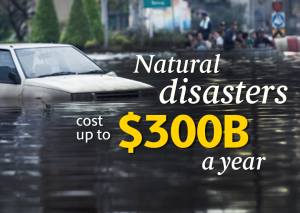Resiliency is Preparedness
Collaboration between cities and the private sector can prepare us for physical, social and economic challenges.
Scott Tew | Ingersoll Rand
Cities across the globe are already experiencing a great deal of change – and stress – associated with the rise of urbanization.
In fact, according to the World Health Organization, urban residents accounted for 54 percent of the total global population in 2015, and that number is expected to grow to 60 percent by 2030.
As a result, cities must prepare to accommodate this urban population growth and address its associated challenges, including food and water shortages, energy demands and congested transportation and housing.
In addition to addressing the demands of urbanization growth, cities must also prepare for climate-related challenges.
Resiliency is preparedness, and cities, as well as companies and organizations, need a resiliency strategy to address these future strains. With these strategies, cities and companies can preemptively plan for and react to unforeseen physical, social and economic challenges, particularly associated with climate change.
Resiliency education
Learning how to approach resiliency is more important now than ever with natural disasters already costing the global economy about $250 – $300 billion a year, according to the U.N. Office for Disaster Risk Reduction.
While companies and cities may adapt and grow to face these changes in different ways, their approach to resiliency is similar.
Here are three ways that cities and companies can learn from each other and partner to advance resiliency:
1. Risk Management
Mitigating and minimizing risk is central to preparedness for both cities and companies. The process of measuring risk, including climate risk, is already built into the standard way of operating business.
In fact, most companies already have broader risk management strategies in place. Cities can learn from these existing processes to measure their climate risk and establish mitigation plans. Moreover, risk management can be most effective when it’s a collaborative process, presenting cities and companies an opportunity to partner in these efforts.
2. Unique Expertise
Companies provide specific skill sets and unique expertise – particularly with available technology – that can help cities continue to serve their citizens during times of stress or natural disaster. City officials can proactively reach out to local companies and partner with them to leverage their knowledge and expertise when establishing resiliency plans.
For example, at Ingersoll Rand, we’ve collaborated with a number of water department officials seeking advice on how to cool wastewater in the face of a loss of electricity. Given our expertise in cooling water, we help advise cities when they are establishing their resiliency plans on the best way to solve water cooling challenges during natural disasters.
3. Mutual Vulnerability
Both cities and companies are vulnerable to changes in their natural environment, including climate change. The automatic assumption when discussing natural disasters is a mental image of changing shorelines.
However, opportunities for resiliency reach beyond shorelines for both cities and companies. Cities understand they face a wide variety of varying challenges, despite their geographic location. In fact, that’s why initiatives such as The Rockefeller Foundation’s 100 Resilient Cities are helping cities establish and implement strong resiliency plans to prepare for both expected and unexpected challenges.
Less stress
Resiliency is about having a backup plan for unplanned events that might affect regular day-to-day functions. It’s a smart way to operate both a city and a company, since both have vulnerabilities regardless of their location.
Companies can learn from city-driven initiatives like 100 Resilient Cities to work with other organizations in entirely different geographic locations to better plan for anticipated and unexpected challenges. Collaboration among cities and companies can help advance both parties in their preparations for the future.
By working together – and learning from each other – these meaningful partnerships can help communities as a whole achieve resiliency and sustainable growth, preparing them to handle anticipated and unexpected environmental, social and economic stresses.
Scott Tew is the founder and leader of the Center for Energy Efficiency & Sustainability at Ingersoll Rand.
This article first appeared on CEF’S EcoInnovator Blog and was republished with permission.



